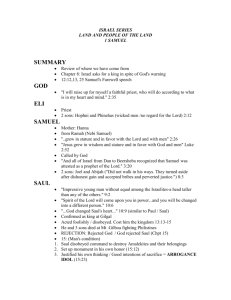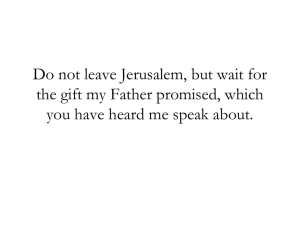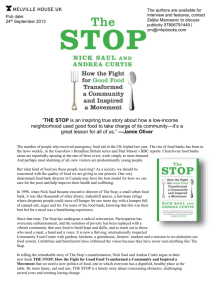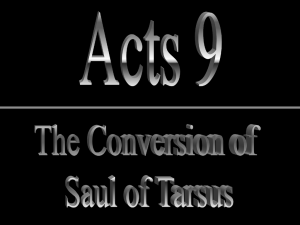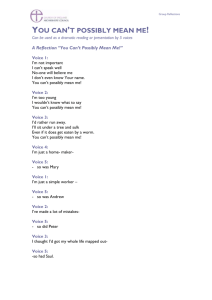SMALL GROUP STUDY GUIDE CHAPTER 11
advertisement
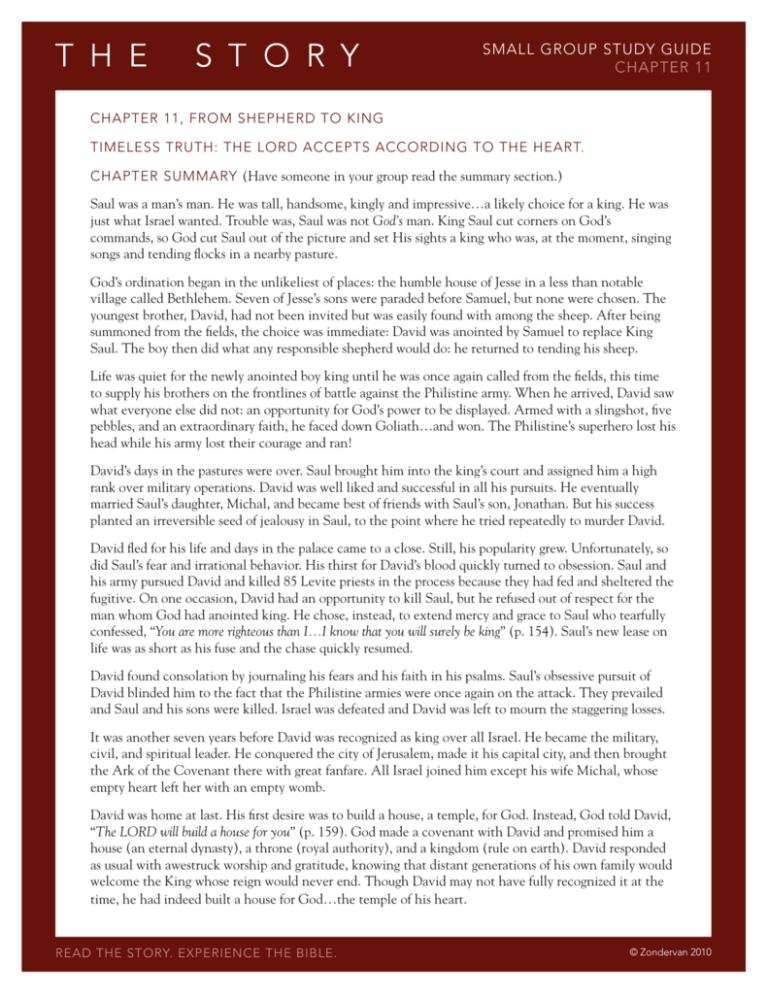
SMALL GROUP STUDY GUIDE CHAPTER 11 CHAPTER 11, FROM SHEPHERD TO KING TIMELESS TRUTH: THE LORD ACCEPTS ACCORDING TO THE HEART. CHAPTER SUMMARY (Have someone in your group read the summary section.) Saul was a man’s man. He was tall, handsome, kingly and impressive…a likely choice for a king. He was just what Israel wanted. Trouble was, Saul was not God’s man. King Saul cut corners on God’s commands, so God cut Saul out of the picture and set His sights a king who was, at the moment, singing songs and tending flocks in a nearby pasture. God’s ordination began in the unlikeliest of places: the humble house of Jesse in a less than notable village called Bethlehem. Seven of Jesse’s sons were paraded before Samuel, but none were chosen. The youngest brother, David, had not been invited but was easily found with among the sheep. After being summoned from the fields, the choice was immediate: David was anointed by Samuel to replace King Saul. The boy then did what any responsible shepherd would do: he returned to tending his sheep. Life was quiet for the newly anointed boy king until he was once again called from the fields, this time to supply his brothers on the frontlines of battle against the Philistine army. When he arrived, David saw what everyone else did not: an opportunity for God’s power to be displayed. Armed with a slingshot, five pebbles, and an extraordinary faith, he faced down Goliath…and won. The Philistine’s superhero lost his head while his army lost their courage and ran! David’s days in the pastures were over. Saul brought him into the king’s court and assigned him a high rank over military operations. David was well liked and successful in all his pursuits. He eventually married Saul’s daughter, Michal, and became best of friends with Saul’s son, Jonathan. But his success planted an irreversible seed of jealousy in Saul, to the point where he tried repeatedly to murder David. David fled for his life and days in the palace came to a close. Still, his popularity grew. Unfortunately, so did Saul’s fear and irrational behavior. His thirst for David’s blood quickly turned to obsession. Saul and his army pursued David and killed 85 Levite priests in the process because they had fed and sheltered the fugitive. On one occasion, David had an opportunity to kill Saul, but he refused out of respect for the man whom God had anointed king. He chose, instead, to extend mercy and grace to Saul who tearfully confessed, “You are more righteous than I…I know that you will surely be king” (p. 154). Saul’s new lease on life was as short as his fuse and the chase quickly resumed. David found consolation by journaling his fears and his faith in his psalms. Saul’s obsessive pursuit of David blinded him to the fact that the Philistine armies were once again on the attack. They prevailed and Saul and his sons were killed. Israel was defeated and David was left to mourn the staggering losses. It was another seven years before David was recognized as king over all Israel. He became the military, civil, and spiritual leader. He conquered the city of Jerusalem, made it his capital city, and then brought the Ark of the Covenant there with great fanfare. All Israel joined him except his wife Michal, whose empty heart left her with an empty womb. David was home at last. His first desire was to build a house, a temple, for God. Instead, God told David, “The LORD will build a house for you” (p. 159). God made a covenant with David and promised him a house (an eternal dynasty), a throne (royal authority), and a kingdom (rule on earth). David responded as usual with awestruck worship and gratitude, knowing that distant generations of his own family would welcome the King whose reign would never end. Though David may not have fully recognized it at the time, he had indeed built a house for God…the temple of his heart. READ THE STORY. EXPERIENCE THE BIBLE. © Zondervan 2010 ICEBREAKER QUESTION: In your childhood, when a team was chosen, were you closer to the first one chosen or the last? 1. When Saul disobeyed God at the end of chapter ten (p. 143), Samuel told Saul that the LORD had sought out a man after God’s own heart and appointed him as the ruler for His people. What does it mean to be a man or woman after God’s own heart based on David’s example? (See Acts 13:21-22.) 2. In his battle with Goliath, “David ran quickly toward the battle line to meet him” (pg. 149). When have you had the courage to face down an impending conflict? 3. Contrast Saul’s downward trajectory and David’s upward trajectory. Where do you see the inverse of Saul in David? 4. What was the fundamental reason for David’s choice to spare Saul’s life in their encounter at En-Gedi (p. 153-154)? How does this choice reflect David’s view of submission and of God? 5. What do you learn about God’s character and His ways from the episode of David and the ark (p.156 158)? (For further insight, see Exodus 25:14 and Numbers 4:15.) Would you characterize your own worship as reserved or unbridled? 6. In humility, David offered to build a house for God, but instead God promised to build a “house” for David. What prompted David’s concern for God’s dwelling place? 7. Through no merit of his own, David received God’s grace through God’s covenant with him (p. 159). What specific covenant promises did God make with David? How is this covenant with David later fulfilled in Christ (Luke 1:32-33)? 8. Identify some episodes from David’s life that demonstrate David’s clear view of God’s Upper Story. How were his choices influenced by that macro view? In the time remaining ask your group members to share any of their personal reflection insights from their journal entries. CLOSING PRAYER SMALL GROUP STUDY GUIDE CHAPTER 11 © Zondervan 2010 Page 2 PERSONAL DEVOTION QUESTIONS CHAPTER 12 CHAPTER 12, THE TRIALS OF A KING Journal your answers to these questions as you read through the chapter this week. You may wish to read one day and journal the next, or spread the questions over the whole week. DAY 1 1. List three to five lessons that you can apply to your own life from the episode of David’s sin. 2. God used Nathan to confront David about his sin. Has anyone ever confronted you about a sin in your life? Who has permission to be your “Nathan”? 3. Compare David’s confrontation with Nathan to Saul’s confrontation with Samuel (p.162-163 and p. 141-143.) What does David seem to understand that Saul does not? DAY 2 1. Psalm 32 (p.165-166) shows what David felt like when he kept his sin a secret. Do you have a secret sin? How does keeping it secret affect you? 2. After David’s baby died, he arose and worshiped (p. 165). What does this say about the nature of worship? About David’s ability to release the past? DAY 3 1. King David grieved over his son Absalom’s death, even though Absalom had betrayed him. Why do you think he reacted this way? 2. David was excited to give his time, money, and effort to building a temple he would not even live to see. Is giving easy or hard for you? How can you be a more cheerful giver? READ THE STORY. EXPERIENCE THE BIBLE. © Zondervan 2010

